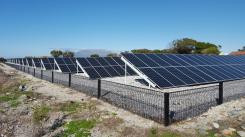Clothing and Textiles Competitiveness Programme (CTCP)
Clothing and Textiles Competitiveness Programme (CTCP)
The CTCP is a programme of the Department of Trade and Industry ("the dti") to stabilise employment and to improve overall competitiveness in the clothing, textiles, footwear, leather and leather goods manufacturing industries.
The CTCP is aimed at structurally changing the clothing, textiles, footwear, leather & leather goods manufacturing industries by providing funding assistance to invest in competitiveness improvement interventions.
The Guidelines (and the supporting Quick Guides) for the CTCP are published on the CTCP website (www.ctcp.co.za) and provide details on the available incentive programmes, as amended from time to time.
The CTCP consists of the following two incentive programmes.
The Production Incentive Programme (PIP)
The PIP aims to help the industry upgrade its processes, products and people. This is expected to move the industry up the value chain to activities that are far more sustainable than competing against "sweatshop" labour practices and pervasive government subsidisation in other developing countries. The PIP is meant to encourage and support upgrading and competitiveness improvement programmes in the sector.
The PIP consists of an Upgrade Grant Facility, which is meant to focus on competitiveness improvement. The PIP is a market-neutral incentive offered to the subsectors listed below, resulting in an incentive benefit equal to 7.5% for the year based on a company's Manufacturing Value Addition (MVA).
The PIP is available to the following (collectively referred to as the "the sector”):
- Clothing manufacturers;
- Textile manufacturers;
- Cut, Make and Trim (CMT) operators;
- Footwear manufacturers;
- Leather goods manufacturers;
- Leather processors (Specifically for Leather Goods and Footwear industries); and
- Design Houses (Provided the design house partners with one or more CMTs).
The Competitiveness Improvement Programme (CIP)
The CIP aims, through the cluster approach, to create a group of globally competitive companies in the qualifying sectors that would ensure a sustainable business environment able to retain and grow employment levels in South Africa. The CIP aims to build and improve capacity and competitiveness in manufacturers and designers through related value chains to effectively supply their customers locally and internationally. The CIP understands competitiveness to encompass issues of cost, quality, flexibility, reliability, adaptability and the capability to innovate. Competitiveness improvement interventions should thus include innovative activities related to people, products, processes and market development.
Competitiveness improvement should focus on achieving higher levels of productivity through industrial and/or process engineering and management activities. Interventions to promote improvement should be based on a thorough benchmarking process, wherein cluster and member performance and processes are compared to "best practise” both locally and internationally. Proposed interventions are required to address the performance gaps identified through the benchmarking analysis. Interventions can include direct shop-floor interventions emphasising the need to improve people, product and processes within the production environment as well as assistance given to the cluster as a whole to improve member's competitiveness capabilities. Competitiveness improvement should also focus on market development in order to find and grow markets for members' manufactured products.
Support offered to Ordinary, National and Subnational Clusters
An Ordinary Cluster is a group of at least five manufacturing companies or a combination of manufacturing and related organisations (e.g. retailers, design houses, component manufacturers) that are collaborating towards improving the competitiveness of cluster members both individually and as a cluster.
The CIP offers Ordinary Clusters a cost-sharing grant incentive of 75% of the qualifying project costs. The remaining 25% should come from the cluster participants. These incentives will not cover costs pertaining to machinery, equipment, commercial vehicles, land or buildings. Grant support for each approved partnership will be limited to a cumulative ceiling of R25-million over the period of the programme implementation.
A National Cluster is a sector or sub-sector wide development initiative coordinated by a national structure that is responsible for facilitating and managing national shared resources and projects as well as overseeing subnational cluster projects, where applicable. Activities of a National Cluster need to focus on Skills Development, Technology Development and Research and Incubation of SME manufacturers, service providers and suppliers through Shared Resources Facilities.
A Subnational Cluster may be formed with or after a National Cluster to implement and support the strategic objectives and activities of the National Cluster.
The CIP offers National Clusters and their supporting Subnational Clusters an initial investment grant of 100% of the approved qualifying expenditure for the first year, where after it becomes a cost sharing grant of 95% from the CIP in year 2, 90% from the CIP in year 3, 80% from the CIP in year 4 and 70% from the CIP in year 5. The balance of funding needs to be raised from cluster participants.
- Region: Africa
- Country: South Africa
- {{ error }}
- Request sent successfully.








